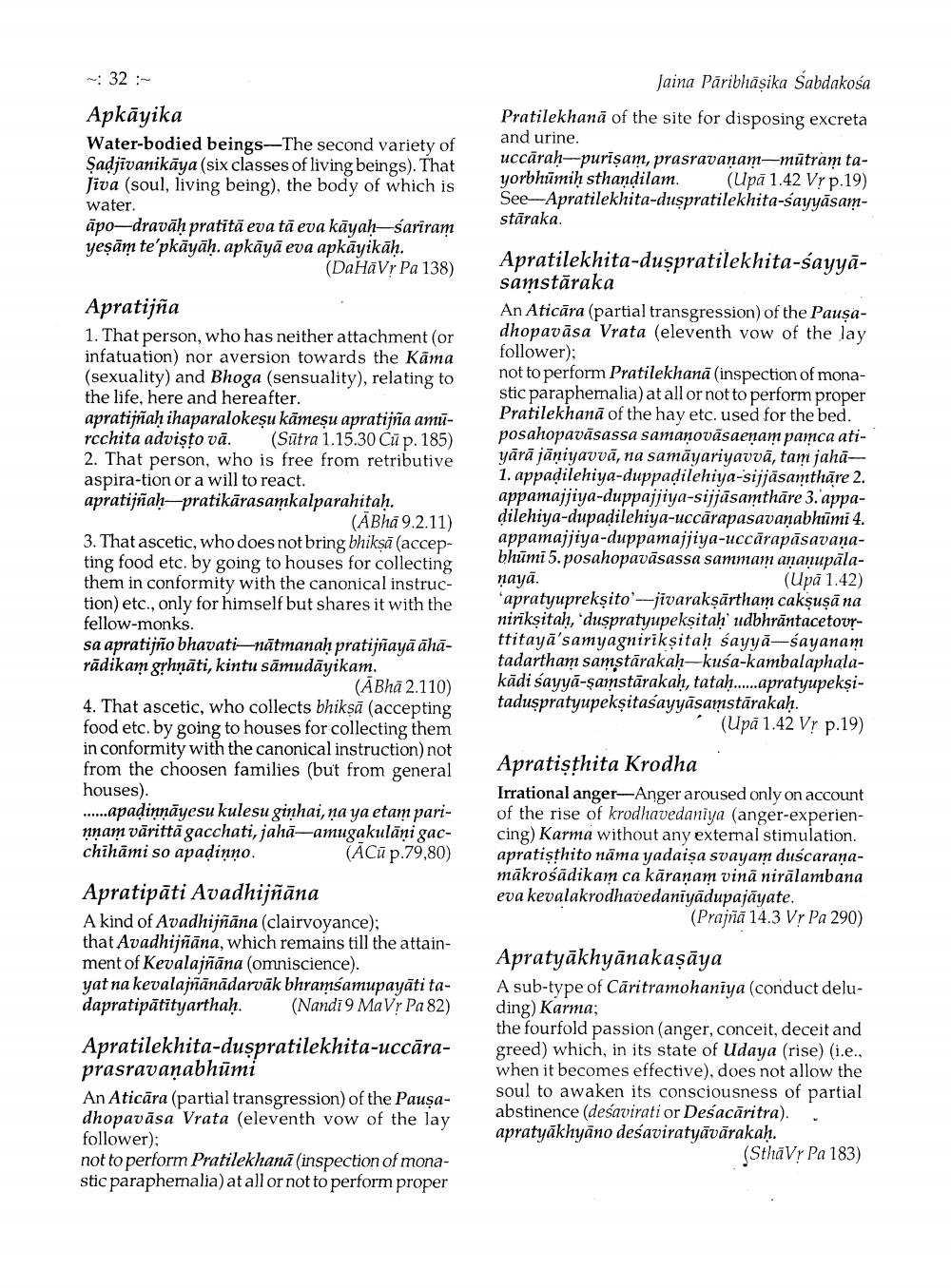________________
32 :
Apkāyika Water-bodied beings-The second variety of Şadjivanikāya (six classes of living beings). That Jiva (soul, living being), the body of which is water. äpo-dravāh pratītā eva tā eva kāyah-sariram yeşām te'pkāyāḥ. apkāyā eva apkāyikāḥ.
(DaHaVr Pa 138)
Jaina Pāribhāṣika Sabdakosa Pratilekhanā of the site for disposing excreta and urine. uccāraḥ-purīşam, prasravanam-műtram tayorbhūmih sthandilam. (Upā 1.42 Vr p.19) See-Apratilekhita-duspratilekhita-sayyāsamstāraka.
Apratijña 1. That person, who has neither attachment (or infatuation) nor aversion towards the Käma (sexuality) and Bhoga (sensuality), relating to the life, here and hereafter. apratijñaḥ ihaparalokeșu kāmeşu apratiña amurcchita advisto vā. (Sūtra 1.15.30 Cū p. 185) 2. That person, who is free from retributive aspira-tion or a will to react. apratijñaḥ-pratikārasamkalparahitah.
(ÄBhā 9.2.11) 3. That ascetic, who does not bring bhikṣā (accepting food etc. by going to houses for collecting them in conformity with the canonical instruction) etc., only for himself but shares it with the fellow-monks. sa apratijño bhavati—nātmanah pratijnayā āhārādikam grhņāti, kintu samudayikam.
(ĀBhā 2.110) 4. That ascetic, who collects bhikṣā (accepting food etc. by going to houses for collecting them in conformity with the canonical instruction) not from the choosen families (but from general houses). ......apadinnāyesu kulesu ginhai, na ya etamparinnam vārittā gacchati, jahă-amugakulāņi gacchihāmi so apadinno.
(ACū p.79,80)
Apratilekhita-duşpratilekhita-sayyāsamstāraka An Aticāra (partial transgression) of the Pausadhopavāsa Vrata (eleventh vow of the lay follower); not to perform Pratilekhanā (inspection of monastic paraphernalia) at all or not to perform proper Pratilekhanā of the hay etc. used for the bed. posahopavāsassa samanovāsaenam pamca atiyārā jāniyavvā, na samāyariyavvā, tam jahā1. appadilehiya-duppadilehiya-sijjāsamthäre 2. appamajjiya-duppajjiya-sijāsamthāre 3. appadilehiya-dupadilehiya-uccārapasavanabhumi 4. appamajjiya-duppamajjiya-uccărapăsavanabhūmi 5.posahopavāsassa sammam ananupāla
(Upā 1.42) ‘apratyuprekşito--jivarakṣārtham cakşuşā na nirikşitah, 'duspratyupekṣitah udbhrāntacetourttitaya'samyagniriksitah sayyā-sayanam tadartham samstārakah-kusa-kambalaphalakādi sayyā-samstārakah, tataḥ......apratyupekşitaduşpratyupekṣitaśayyāsamstārakaḥ.
(upa 1.42 Vr p.19)
nayā.
Apratişthita Krodha Irrational anger-Anger aroused only on account of the rise of krodhavedaniya (anger-experiencing) Karma without any external stimulation. apratisthito nāma yadaişa svayam duscaranamākrośādikam ca kāraṇam vină nirālambana eva kevalakrodhavedaniyādupajāyate.
(Prajñā 14.3 V? Pa 290)
Apratipāti Avadhijñāna A kind of Avadhijñāna (clairvoyance); that Avadhijñāna, which remains till the attainment of Kevalajñāna (omniscience). yat na kevalajānādarvāk bhramsamupayāti tadapratipātītyarthaḥ. (Nandi 9 MaV? Pa 82)
Apratilekhita-duspratilekhita-uccāraprasravaṇabhūmi An Aticāra (partial transgression) of the Pausadhopavāsa Vrata (eleventh vow of the lay follower); not to perform Pratilekhanā (inspection of monastic paraphernalia) at all or not to perform proper
Apratyākhyānakaṣāya A sub-type of Cāritramohaniya (conduct deluding) Karma; the fourfold passion (anger, conceit, deceit and greed) which, in its state of Udaya (rise) (i.e., when it becomes effective), does not allow the soul to awaken its consciousness of partial abstinence (desavirati or Deśacăritra). apratyākhyāno deśaviratyāvārakah.
(SthāV? Pa 183)




